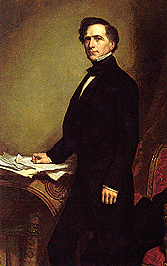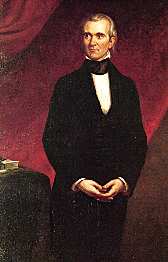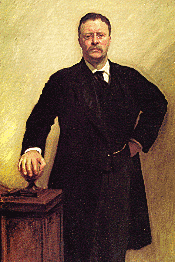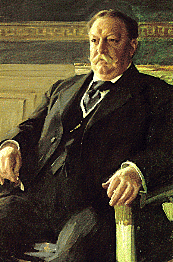
|

|
Born in Hillsborough, New Hampshire, in 1804, Pierce attended Bowdoin College. After graduation he studied law, then entered politics. At 24 he was elected to the New Hampshire legislature; two years later he became its Speaker. During the 1830's he went to Washington, first as a Representative, then as a Senator. Pierce, after serving in the Mexican War, was proposed by New Hampshire friends for the Presidential nomination in 1852. At the Democratic Convention, the delegates agreed easily enough upon a platform pledging undeviating support of the Compromise of 1850 and hostility to any efforts to agitate the slavery question. But they balloted 48 times and eliminated all the well-known candidates before nominating Pierce, a true "dark horse."
Probably because the Democrats stood more firmly for the Compromise than the Whigs, and because Whig candidate Gen. Winfield Scott was suspect in the South, Pierce won with a narrow margin of popular votes.
Two months before he took office, he and his wife saw their eleven-year-old son killed when their train was wrecked. Grief-stricken, Pierce entered the Presidency nervously exhausted. In his Inaugural he proclaimed an era of peace and prosperity at home, and vigor in relations with other nations. The United States might have to acquire additional possessions for the sake of its own security, he pointed out, and would not be deterred by "any timid forebodings of evil."
Pierce had only to make gestures toward expansion to excite the wrath of northerners, who accused him of acting as a cat's-paw of Southerners eager to extend slavery into other areas. Therefore he aroused apprehension when he pressured Great Britain to relinquish its special interests along part of the Central American coast, and even more when he tried to persuade Spain to sell Cuba.
But the most violent renewal of the storm stemmed from the Kansas-Nebraska Act, which repealed the Missouri Compromise and reopened the question of slavery in the West. This measure, the handiwork of Senator Stephen A. Douglas, grew in part out of his desire to promote a railroad from Chicago to California through Nebraska. Already Secretary of War Jefferson Davis, advocate of a southern transcontinental route, had persuaded Pierce to send James Gadsden to Mexico to buy land for a southern railroad. He purchased the area now comprising southern Arizona and part of southern New Mexico for $10,000,000.
Douglas's proposal, to organize western territories through which a railroad might run, caused extreme trouble. Douglas provided in his bills that the residents of the new territories could decide the slavery question for themselves. The result was a rush into Kansas, as southerners and northerners vied for control of the territory. Shooting broke out, and "bleeding Kansas" became a prelude to the Civil War.
By the end of his administration, Pierce could claim "a peaceful condition of things in Kansas." But, to his disappointment, the Democrats refused to renominate him, turning to the less controversial Buchanan. Pierce returned to New Hampshire, leaving his successor to face the rising fury of the sectional whirlwind. He died in 1869.


|
He was born in Mecklenburg County, North Carolina, in 1795. Studious and industrious, Polk was graduated with honors in 1818 from the University of North Carolina. As a young lawyer he entered politics, served in the Tennessee legislature, and became a friend of Andrew Jackson.
In the House of Representatives, Polk was a chief lieutenant of Jackson in his Bank war. He served as Speaker between 1835 and 1839, leaving to become Governor of Tennessee.
Until circumstances raised Polk's ambitions, he was a leading contender for the Democratic nomination for Vice President in 1844. Both Martin Van Buren, who had been expected to win the Democratic nomination for President, and Henry Clay, who was to be the Whig nominee, tried to take the expansionist issue out of the campaign by declaring themselves opposed to the annexation of Texas. Polk, however, publicly asserted that Texas should be "re-annexed" and all of Oregon "re-occupied."
The aged Jackson, correctly sensing that the people favored expansion, urged the choice of a candidate committed to the Nation's "Manifest Destiny." This view prevailed at the Democratic Convention, where Polk was nominated on the ninth ballot. "Who is James K. Polk?" Whigs jeered. Democrats replied Polk was the candidate who stood for expansion. He linked the Texas issue, popular in the South, with the Oregon question, attractive to the North. Polk also favored acquiring California. Even before he could take office, Congress passed a joint resolution offering annexation to Texas. In so doing they bequeathed Polk the possibility of war with Mexico, which soon severed diplomatic relations.
In his stand on Oregon, the President seemed to be risking war with Great Britain also. The 1844 Democratic platform claimed the entire Oregon area, from the California boundary northward to a latitude of 54'40', the southern boundary of Russian Alaska. Extremists proclaimed "Fifty-four forty or fight," but Polk, aware of diplomatic realities, knew that no course short of war was likely to get all of Oregon. Happily, neither he nor the British wanted a war. He offered to settle by extending the Canadian boundary, along the 49th parallel, from the Rockies to the Pacific. When the British minister declined, Polk reasserted the American claim to the entire area. Finally, the British settled for the 49th parallel, except for the southern tip of Vancouver Island. The treaty was signed in 1846. Acquisition of California proved far more difficult. Polk sent an envoy to offer Mexico up to $20,000,000, plus settlement of damage claims owed to Americans, in return for California and the New Mexico country. Since no Mexican leader could cede half his country and still stay in power, Polk's envoy was not received. To bring pressure, Polk sent Gen. Zachary Taylor to the disputed area on the Rio Grande.
To Mexican troops this was aggression, and they attacked Taylor's forces.
Congress declared war and, despite much Northern opposition, supported the military operations. American forces won repeated victories and occupied Mexico City. Finally, in 1848, Mexico ceded New Mexico and California in return for $15,000,000 and American assumption of the damage claims.
President Polk added a vast area to the United States, but its acquisition precipitated a bitter quarrel between the North and the South over expansion of slavery.
Polk, leaving office with his health undermined from hard work, died in June 1849.


|
On February 6, 1911, Ronald Wilson Reagan was born to Nelle and John Reagan in Tampico, Illinois. He attended high school in nearby Dixon and then worked his way through Eureka College. There, he studied economics and sociology, played on the football team, and acted in school plays. Upon graduation, he became a radio sports announcer. A screen test in 1937 won him a contract in Hollywood. During the next two decades he appeared in 53 films. From his first marriage to actress Jane Wyman, he had two children, Maureen and Michael. Maureen passed away in 2001. In 1952 he married Nancy Davis, who was also an actress, and they had two children, Patricia Ann and Ronald Prescott.
As president of the Screen Actors Guild, Reagan became embroiled in disputes over the issue of Communism in the film industry; his political views shifted from liberal to conservative. He toured the country as a television host, becoming a spokesman for conservatism. In 1966 he was elected Governor of California by a margin of a million votes; he was re-elected in 1970. Ronald Reagan won the Republican Presidential nomination in 1980 and chose as his running mate former Texas Congressman and United Nations Ambassador George Bush. Voters troubled by inflation and by the year-long confinement of Americans in Iran swept the Republican ticket into office. Reagan won 489 electoral votes to 49 for President Jimmy Carter.
On January 20, 1981, Reagan took office. Only 69 days later he was shot by a would-be assassin, but quickly recovered and returned to duty. His grace and wit during the dangerous incident caused his popularity to soar.
Dealing skillfully with Congress, Reagan obtained legislation to stimulate economic growth, curb inflation, increase employment, and strengthen national defense. He embarked upon a course of cutting taxes and Government expenditures, refusing to deviate from it when the strengthening of defense forces led to a large deficit.
A renewal of national self-confidence by 1984 helped Reagan and Bush win a second term with an unprecedented number of electoral votes. Their victory turned away Democratic challengers Walter F. Mondale and Geraldine Ferraro.
In 1986 Reagan obtained an overhaul of the income tax code, which eliminated many deductions and exempted millions of people with low incomes. At the end of his administration, the Nation was enjoying its longest recorded period of peacetime prosperity without recession or depression.
In foreign policy, Reagan sought to achieve "peace through strength." During his two terms he increased defense spending 35 percent, but sought to improve relations with the Soviet Union. In dramatic meetings with Soviet leader Mikhail Gorbachev, he negotiated a treaty that would eliminate intermediate-range nuclear missiles. Reagan declared war against international terrorism, sending American bombers against Libya after evidence came out that Libya was involved in an attack on American soldiers in a West Berlin nightclub.
By ordering naval escorts in the Persian Gulf, he maintained the free flow of oil during the Iran-Iraq war. In keeping with the Reagan Doctrine, he gave support to anti-Communist insurgencies in Central America, Asia, and Africa.
Overall, the Reagan years saw a restoration of prosperity, and the goal of peace through strength seemed to be within grasp.


|
Born in 1882 at Hyde Park, New York--now a national historic site--he attended Harvard University and Columbia Law School. On St. Patrick's Day, 1905, he married Eleanor Roosevelt. Following the example of his fifth cousin, President Theodore Roosevelt, whom he greatly admired, Franklin D. Roosevelt entered public service through politics, but as a Democrat. He won election to the New York Senate in 1910. President Wilson appointed him Assistant Secretary of the Navy, and he was the Democratic nominee for Vice President in 1920.
In the summer of 1921, when he was 39, disaster hit-he was stricken with poliomyelitis. Demonstrating indomitable courage, he fought to regain the use of his legs, particularly through swimming. At the 1924 Democratic Convention he dramatically appeared on crutches to nominate Alfred E. Smith as "the Happy Warrior." In 1928 Roosevelt became Governor of New York.
He was elected President in November 1932, to the first of four terms. By March there were 13,000,000 unemployed, and almost every bank was closed. In his first "hundred days," he proposed, and Congress enacted, a sweeping program to bring recovery to business and agriculture, relief to the unemployed and to those in danger of losing farms and homes, and reform, especially through the establishment of the Tennessee Valley Authority.
By 1935 the Nation had achieved some measure of recovery, but businessmen and bankers were turning more and more against Roosevelt's New Deal program. They feared his experiments, were appalled because he had taken the Nation off the gold standard and allowed deficits in the budget, and disliked the concessions to labor. Roosevelt responded with a new program of reform: Social Security, heavier taxes on the wealthy, new controls over banks and public utilities, and an enormous work relief program for the unemployed.
In 1936 he was re-elected by a top-heavy margin. Feeling he was armed with a popular mandate, he sought legislation to enlarge the Supreme Court, which had been invalidating key New Deal measures. Roosevelt lost the Supreme Court battle, but a revolution in constitutional law took place. Thereafter the Government could legally regulate the economy.
Roosevelt had pledged the United States to the "good neighbor" policy, transforming the Monroe Doctrine from a unilateral American manifesto into arrangements for mutual action against aggressors. He also sought through neutrality legislation to keep the United States out of the war in Europe, yet at the same time to strengthen nations threatened or attacked. When France fell and England came under siege in 1940, he began to send Great Britain all possible aid short of actual military involvement.
When the Japanese attacked Pearl Harbor on December 7, 1941, Roosevelt directed organization of the Nation's manpower and resources for global war.
Feeling that the future peace of the world would depend upon relations between the United States and Russia, he devoted much thought to the planning of a United Nations, in which, he hoped, international difficulties could be settled.
As the war drew to a close, Roosevelt's health deteriorated, and on April 12, 1945, while at Warm Springs, Georgia, he died of a cerebral hemorrhage.


|
He took the view that the President as a "steward of the people" should take whatever action necessary for the public good unless expressly forbidden by law or the Constitution." I did not usurp power," he wrote, "but I did greatly broaden the use of executive power."
Roosevelt's youth differed sharply from that of the log cabin Presidents. He was born in New York City in 1858 into a wealthy family, but he too struggled--against ill health--and in his triumph became an advocate of the strenuous life.
In 1884 his first wife, Alice Lee Roosevelt, and his mother died on the same day. Roosevelt spent much of the next two years on his ranch in the Badlands of Dakota Territory. There he mastered his sorrow as he lived in the saddle, driving cattle, hunting big game--he even captured an outlaw. On a visit to London, he married Edith Carow in December 1886.
During the Spanish-American War, Roosevelt was lieutenant colonel of the Rough Rider Regiment, which he led on a charge at the battle of San Juan. He was one of the most conspicuous heroes of the war.
Boss Tom Platt, needing a hero to draw attention away from scandals in New York State, accepted Roosevelt as the Republican candidate for Governor in 1898. Roosevelt won and served with distinction.
As President, Roosevelt held the ideal that the Government should be the great arbiter of the conflicting economic forces in the Nation, especially between capital and labor, guaranteeing justice to each and dispensing favors to none.
Roosevelt emerged spectacularly as a "trust buster" by forcing the dissolution of a great railroad combination in the Northwest. Other antitrust suits under the Sherman Act followed.
Roosevelt steered the United States more actively into world politics. He liked to quote a favorite proverb, "Speak softly and carry a big stick."
Aware of the strategic need for a shortcut between the Atlantic and Pacific, Roosevelt ensured the construction of the Panama Canal. His corollary to the Monroe Doctrine prevented the establishment of foreign bases in the Caribbean and arrogated the sole right of intervention in Latin America to the United States.
He won the Nobel Peace Prize for mediating the Russo-Japanese War, reached a Gentleman's Agreement on immigration with Japan, and sent the Great White Fleet on a goodwill tour of the world. Some of Theodore Roosevelt's most effective achievements were in conservation. He added enormously to the national forests in the West, reserved lands for public use, and fostered great irrigation projects.
He crusaded endlessly on matters big and small, exciting audiences with his high-pitched voice, jutting jaw, and pounding fist. "The life of strenuous endeavor" was a must for those around him, as he romped with his five younger children and led ambassadors on hikes through Rock Creek Park in Washington, D.C.
Leaving the Presidency in 1909, Roosevelt went on an African safari, then jumped back into politics. In 1912 he ran for President on a Progressive ticket. To reporters he once remarked that he felt as fit as a bull moose, the name of his new party.
While campaigning in Milwaukee, he was shot in the chest by a fanatic. Roosevelt soon recovered, but his words at that time would have been applicable at the time of his death in 1919: "No man has had a happier life than I have led; a happier life in every way."


|
Born in 1857, the son of a distinguished judge, he was graduated from Yale, and returned to Cincinnati to study and practice law. He rose in politics through Republican judiciary appointments, through his own competence and availability, and because, as he once wrote facetiously, he always had his "plate the right side up when offices were falling."
But Taft much preferred law to politics. He was appointed a Federal circuit judge at 34. He aspired to be a member of the Supreme Court, but his wife, Helen Herron Taft, held other ambitions for him.
His route to the White House was via administrative posts. President McKinley sent him to the Philippines in 1900 as chief civil administrator. Sympathetic toward the Filipinos, he improved the economy, built roads and schools, and gave the people at least some participation in government.
President Roosevelt made him Secretary of War, and by 1907 had decided that Taft should be his successor. The Republican Convention nominated him the next year.
Taft disliked the campaign--"one of the most uncomfortable four months of my life." But he pledged his loyalty to the Roosevelt program, popular in the West, while his brother Charles reassured eastern Republicans. William Jennings Bryan, running on the Democratic ticket for a third time, complained that he was having to oppose two candidates, a western progressive Taft and an eastern conservative Taft.
Progressives were pleased with Taft's election. "Roosevelt has cut enough hay," they said; "Taft is the man to put it into the barn." Conservatives were delighted to be rid of Roosevelt--the "mad messiah."
Taft recognized that his techniques would differ from those of his predecessor. Unlike Roosevelt, Taft did not believe in the stretching of Presidential powers. He once commented that Roosevelt "ought more often to have admitted the legal way of reaching the same ends."
Taft alienated many liberal Republicans who later formed the Progressive Party, by defending the Payne-Aldrich Act which unexpectedly continued high tariff rates. A trade agreement with Canada, which Taft pushed through Congress, would have pleased eastern advocates of a low tariff, but the Canadians rejected it. He further antagonized Progressives by upholding his Secretary of the Interior, accused of failing to carry out Roosevelt's conservation policies.
In the angry Progressive onslaught against him, little attention was paid to the fact that his administration initiated 80 antitrust suits and that Congress submitted to the states amendments for a Federal income tax and the direct election of Senators. A postal savings system was established, and the Interstate Commerce Commission was directed to set railroad rates.
In 1912, when the Republicans renominated Taft, Roosevelt bolted the party to lead the Progressives, thus guaranteeing the election of Woodrow Wilson.
Taft, free of the Presidency, served as Professor of Law at Yale until President Harding made him Chief Justice of the United States, a position he held until just before his death in 1930. To Taft, the appointment was his greatest honor; he wrote: "I don't remember that I ever was President."
